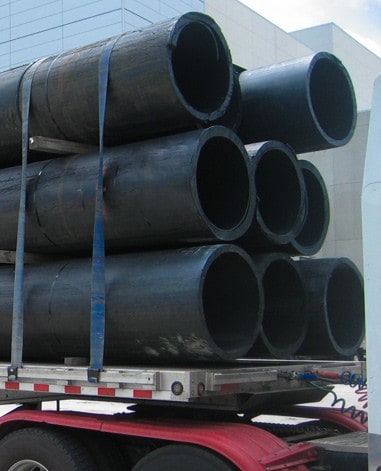hdpe pipe suppliers Midland TX: Selection Guide for Contractors
Wiki Article
Understanding the Secret Perks of HDPE Pipe for Water and Wastewater Administration
Making use of HDPE pipe in water and wastewater administration presents many benefits that warrant factor to consider. Its outstanding toughness and long life-span make it a recommended option for numerous tasks. Furthermore, the product's resistance to rust and chemical damages enhances its integrity in various atmospheres. However, the benefits expand beyond simply long life and resistance. Exploring its cost-effectiveness and environmental influence exposes a lot more engaging reasons for its widespread adoption in modern infrastructureExceptional Durability and Durability

HDPE pipeline sticks out for its exceptional toughness and durability, making it a favored option in water administration systems. Constructed from high-density polyethylene, these pipelines can stand up to substantial stress and tension, ensuring reputable efficiency gradually. Their durable nature allows them to endure extreme environmental problems, consisting of temperature level changes and soil motions, which can trigger various other products to fall short.
The lifespan of HDPE pipes commonly surpasses 50 years, supplying a cost-effective service for communities and markets alike. Additionally, the product's light-weight buildings simplify installment, decreasing labor costs and durations. This toughness lessens the demand for regular fixings or substitutes, additionally enhancing its financial allure.
In water management applications, the dependability of HDPE pipelines implies fewer interruptions and improved solution connection, making them important to lasting infrastructure growth. The combination of sturdiness and longevity solidifies HDPE's function as a foundation in effective water monitoring solutions.

Resistance to Deterioration and Chemical Damages
While numerous materials catch deterioration and chemical damages in time, HDPE pipes display impressive resistance, making them suitable for different water administration applications. This resilience comes from the molecular framework of high-density polyethylene, which is naturally non-reactive and does not wear away like steels or degrade from direct exposure to extreme chemicals. Because of this, HDPE is highly reliable in environments with hostile substances, such as wastewater systems that might include acids, bases, and organic solvents.
Additionally, HDPE pipes can endure environmental aspects such as soil level of acidity and saline problems, better improving their viability for varied applications (Texas hdpe pipe manufacturer). Their capacity to keep architectural honesty in time reduces the risk of leakages and failures, which is critical in guaranteeing the safety and reliability of water circulation and wastewater administration systems. The resistance to rust and chemical damages significantly adds to the general performance and long life of HDPE piping options.
Cost-Effectiveness and Financial Benefits
When taking into consideration the monetary ramifications of water monitoring systems, the cost-effectiveness of HDPE pipes becomes apparent. These pipelines provide lower installment and maintenance costs contrasted to conventional materials like steel or concrete. Their light-weight nature simplifies transportation and installment, resulting in lowered labor costs. Furthermore, HDPE pipes show a lengthy life expectancy, commonly going beyond 50 years, which equates to fewer substitutes and long-term savings.In addition, the resistance of HDPE to corrosion and chemical damages decreases the need for costly repair work and substitutes. The pipes additionally sustain efficient water flow, lowering power costs related to pumping systems. By alleviating leaks and water loss, HDPE pipelines add to significant economic advantages for districts and markets alike. On the whole, the first financial investment in HDPE piping can generate substantial monetary returns over the lifespan of the water management system, making it a sensible option for lasting facilities advancement.
Environmental Sustainability and Minimized Effect

Convenience and Flexibility in Installment
Due to the fact that of their unique residential or commercial properties, HDPE pipelines provide exceptional versatility and flexibility in installment, making them appropriate for a large range of applications. Their light-weight nature enables simpler handling and transportation, minimizing labor prices and installment time. HDPE pipelines can be bent and shaped to fit different surfaces and task requirements, which is specifically beneficial in challenging environments.Furthermore, their resistance to deterioration and chemical damage permits installation in varied settings without the need for specialized safety finishes. The ability to fuse joints creates a continual, leak-free system, improving the total stability and dependability of the setup. HDPE's adaptability also suits ground motion, decreasing the threat of damage in locations susceptible to changing soil. On the whole, these attributes make HDPE pipelines not just flexible but additionally a favored selection for water and wastewater management systems.
Frequently Asked Concerns
Just How Does HDPE Pipe Contrast to PVC in Water Monitoring Applications?
HDPE pipe provides premium versatility, resistance to deterioration, and resilience contrasted to PVC. Its lighter weight facilitates easier installation, while its lengthy life-span minimizes substitute costs, making HDPE a recommended option in water monitoring applications.What Is the Life-span of HDPE Pipeline Under Common Problems?
Under more info common problems, HDPE pipelines can have a life-span ranging from 50 to 100 years. Their toughness and resistance to deterioration contribute to their lasting performance in various applications, making them a trusted option for infrastructure.Are HDPE Pipeline Recyclable After Their Life Span?
Yes, HDPE pipes are recyclable after their service life. Pipe Supplier American Plastics Midland. They can be refined and repurposed right into new products, greatly reducing environmental influence and promoting sustainability within the market, making them a green selection for piping servicesWhat Is the Setup Process for HDPE Pipes?
The installation process for HDPE pipelines involves site preparation, trenching, pipeline fusion or mechanical signing up with, backfilling, and pressure testing. Proper strategies assure a resilient and reliable system for moving water and wastewater properly.Can HDPE Pipes Be Used for Both Drinkable and Non-Potable Water Equipments?
Yes, HDPE pipes can be utilized for both drinkable and non-potable water supply. Their convenience, resilience, and resistance to deterioration make them ideal for different applications, guaranteeing risk-free and reliable transportation of water in various contexts.Report this wiki page